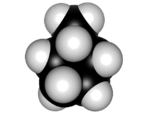Methylcyclopentane
| |||
| Names | |||
|---|---|---|---|
| IUPAC name
Methylcyclopentane | |||
| Identifiers | |||
| 96-37-7 | |||
| 3D model (Jmol) | Interactive image | ||
| ChemSpider | 7024 | ||
| ECHA InfoCard | 100.002.277 | ||
| EC Number | 202-503-2 | ||
| PubChem | 7296 | ||
| |||
| |||
| Properties | |||
| C6H12 | |||
| Molar mass | 84.16 g·mol−1 | ||
| Appearance | Colorless liquid | ||
| Density | 0.749 g/cm3[1] | ||
| Melting point | −142.4 °C (−224.3 °F; 130.8 K)[1] | ||
| Boiling point | 71.8 °C (161.2 °F; 344.9 K)[1] | ||
| Insoluble | |||
| Hazards | |||
| Main hazards | flammable | ||
| Flash point | −4 °C (25 °F; 269 K) | ||
| 260 °C (500 °F; 533 K) | |||
| Except where otherwise noted, data are given for materials in their standard state (at 25 °C [77 °F], 100 kPa). | |||
| | |||
| Infobox references | |||
Methylcyclopentane is an organic compound with the chemical formula CH3C5H9. It is a colourless, flammable liquid with a faint odor. It is a component of the naphthene fraction of petroleum. It usually is obtained as a mixture with cyclohexane. It is mainly converted in naphthene reformers to benzene..[2] Methylcyclopentane is not perfectly planar and can pucker to alleviate stress in its structure.[3]
References
- 1 2 3 Lide, David. R, ed. (2009). CRC Handbook of Chemistry and Physics (89th ed.). CRC Press. ISBN 978-1-4200-6679-1.
- ↑ M. Larry Campbell. "Cyclohexane" in Ullmann's Encyclopedia of Industrial Chemistry, Wiley-VCH, Weinheim, 2012. doi:10.1002/14356007.a08_209.pub2
- ↑ Carey, Francis; Giuliano, Robert (2014). "3". Organic Chemistry (9 ed.). McGraw-Hill. pp. 97–131. ISBN 978-0073402741.
This article is issued from Wikipedia - version of the 7/15/2016. The text is available under the Creative Commons Attribution/Share Alike but additional terms may apply for the media files.

